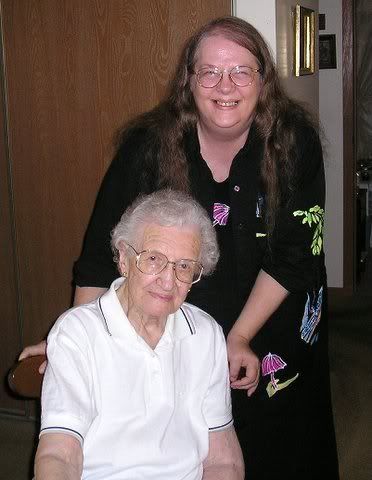One more down ... a baby paper and a mama paper to go...

*Sigh* This is our happy Dr. M. face … sometimes now when we’re feeling kinda bad … we look at his movie and we feel better … But, there’s always a feeling of taking turns … the first set of pictures is Ann, the second set of pictures is Kate.

This is just me … thinking I’m probably stalling again … better get back to business. (I’m Corey).

u10d2 Intelligence
Part I: Thoroughly trace how intelligence has been defined and measured through time. How do early views and tests of intelligence differ from more contemporary models of intelligence? How are they similar? What are your viewpoints about whether the concept of IQ explains a person's overall intellectual functioning and whether affective or emotional intelligence theories are helpful in understanding an individual's psychological well-being?
Part II: Contextualists underscore the importance of viewing intelligence within a given context. What are some aspects of your social, mental, or physical context that you consider important to the expression of your intelligence?
Paper …
In tracing how intelligence has been defined and measured through time, Sternberg (2003) notes that in 1921 the Journal of Educational Psychology asked important psychologists questions as to capacity and adaptability of intelligence, and this question was repeated 65 years later. He summarizes intelligence as “the capacity to learn from experience using metacognitive processes to enhance learning, and the ability to adapt to the surrounding environment, which may require different adaptations within different social and cultural contexts” (Sternberg, 2003).
The Oxford English Dictionary began utilizing the word intelligence 700 years ago, but Sternberg writes that the word is more often defined implicitly by regular people who estimate the people around us as having the ability to think more or less (Sternberg, 2003). I was born in 1959 and grew up from infancy with a devalued idea of who we were and how smart we were primarily due to incest and physical abuse. The acceptance of intelligence has just started in our mid-forties. The family I grew up with used words like stupid, witch, dog, and idiot or worse, which had as much affect as the sexual and physical abuse. They capitalized on our differences. I then married into a relationship that continued the emotional abuse so that I thought I was smart only if he was in the mood. It felt illusionary.
We considered ourselves to have a hint of intelligence when we were diagnosed 16 years ago as a multiple; because the doctors and books were saying that most multiples are highly intelligent and creative. I took this to mean “off-the-shelve” that something must have been different enough that we were allowed a dissociative escape from our surroundings. I looked at it as more survival smart than being intellectually smart. Through the multiplicity we were always able to be one or more steps detached. In the adaptation to our environment, we utilized unknowingly alters who would psychologically suffer or suffice through what had obviously been the worst that could personally ever happen. I say the difference between then and now was the vulnerability of the age, isolation within the family, and the knowledge that we’ve grown far too psychologically strong to think we would ever be forced again into a pattern of lifelong abusive relationships.
About a year ago, as a part of some testing of our memory, they found that our recall was moderately impaired. This didn’t surprise us. We had gone in knowing the problems we were facing because of not remembering were real. But, the unique factor of the testing process was that they also tested our intelligence. We are no genius, but we did turn out to have superior intelligence. We’ve been living in the bubble of this knowledge ever since. It has pleased us that the information going in is there although we can’t always recite it back.
It is from this point of view I look again toward the assignment questions. Through our given experiences we find the definition that Sternberg gives on intelligence is very fair to our understanding of things. No matter what was given to us, we’ve always felt a deep need and challenge to learn and we concentrated most on comparing and contrasting our experiences from that of others and how they were different or the same from our own. We have always gravitated toward the safety of teachers and professors and our analytical ability has served us well, though I consider us very slow and halting.
With so many parts within us, it seemed natural enough that our minds would be in constant movement. We often think in response to other parts’ thoughts, so we have pretty much a running dialogue within that seems more aptly titled our stream of consciousness. Because we are such strong supporters and advocates of each other, we most likely have learned to enhance our learning experiences just through the patience of waiting for each part to develop their next achievement. I know that at this point of our life, we’ve committed ourselves to learning about learning through educational psychology. We’ve always adapted to people, our hope is that we now can adapt to structured “real” time and our own goals. I consider the family of past to have deeply affected our cultural context. It is up to us as an internal family to shape our present and future.
In looking back over the work of this last hour or so, it would seem that we’ve been defining and measuring our intelligence in our time rather than the great minds of fairly recent time. The evaluation of where we’ve been on our own intellectual scale serves as a grounding point in being connected with the concepts being taught. As a summary of the work that has gone on through time: (Each based from Sternberg, 2003)
Tradition #1: Lower-level psychophysical abilities:
Galton (1822-1911) “Intelligence is a function of psychophysical abilities” and measured “a range of psychophysical skills and sensitivities.”
Sissler (1901) “Attempted to detect links among the assorted tests” (He failed)
Tradition #2: Higher-level judgmental abilities:
Binet (1857-1911) “Intelligence as a function of the ability to learn within an academic setting” and it entails “direction, adaptation, and criticism” Developed an intelligence test
Stern (1912) Developed intelligence quotient (IQ) as “a ratio of mental age (MA) divided by chronological age (CA), multiplied by 100”
Terman (1937) Developed Stanford-Binet Intelligence Scales
Wechsler Developed Wechsler Intelligence Scales “The overall score is a combination of the verbal and the performance scores”
Factor Analysis “a statistical method for separating a construct … into a number of hypothetical factors or abilities”
Spearman (1927) G-General (mental ability) and S-Specific abilities
Thurstone (1938) Seven factors “primal mental abilities”
Guildford (1950, 1967, 1982, &1988) 150 factors with the dimensional framework of “various operations, contents, and products”
Cattell (1971) Two sub-factors “fluid ability (Speed and accuracy of abstract reasoning …) and crystallized ability (accumulated knowledge and vocabulary)
Vernon (1971) Two sub-factors “practical-mechanical and verbal-educational abilities”
Carroll (1993) “Hierarchical model of intelligence” divided into “Stratum 1, which includes many narrow, specific abilities…: Stratum II, which includes various broad abilities …’ and Stratum III, which is just a single general intelligence such as Spearman’s g”
Information-processing theorists
Nettelbeck (1987) “Speed-related indicator of intelligence, involving the encoding of visual information for brief storage in working memory”
Jensen (1982) “intelligence can be understood in terms of speed of neuronal conduction”
Hunt (1978) Lexical-access speed “Speed with which we can retrieve information about words”
Sternberg (1977, 1983, 1984a) Studied “complex tasks, such as analogies, series problems … and syllogisms”
Biological Bases of Intelligence
Jerison (2000) “Relationship of brain size to intelligence”
Barrett (1992) “Patterns of electrical activity in the brain … appear to correlate with scores on IQ tests”
Wickett (1994) “neural-conduction velocity appears to be a more powerful predictor of IQ scors for men than women”
Haier (1992) “higher intelligence correlates with reduced levels fo glucose metabolism during problem-solving tasks”
Larson (1995) “the relationship between glucose metabolism and intelligence may be more complex”
Dempster (1991) “Performance on intelligences tests may not indicate a crucial aspect of intelligence: the ability to set goals, to plan how to meet them and to execute those plans”
Paper Break … Gone to bed!

Good morning … this is us again … we’re up now. It’s about 5 am … Got about an hour and a half to work on the paper. So we’re going to take a few more sips then start.
Paper continued …
In looking at the earlier views compared to the more contemporary views my first thought was that the work started off on a physical plane then went through specifically a more mental plane, and is now back to a physical plane through biology or brain scanning equipment. Psychologists did not have the advantage that we do today of the advanced tests and measurement devises, but their work seemed to foreshadow what would become. It also seems that we’ve come only as far in the study of intelligence as our present day tests will allow. It has been a long period of time, relatively speaking, of capitalizing on the work of just a few intelligent modeled tests. The definition of intelligence has not seemed to change much in time, though the study of factor analysis has given merit toward comprehending the elements at hand that make for the ability to think. It seems like nobody in particular has nailed the specific nature of intelligence, in a sense giving it a simple “gotcha” experience. Mainly, the work has been in models that might be useful, but not definitive.
I think that the IQ test is useful in that although it doesn’t describe what intelligence is, it does give us a comparative model of thought differences or abilities between one person and another. In a sense, the questions asked of the test break down almost like factors the ability to think in complex steps. I think it falters in that while testing certain known aspects of intelligence, it does not test at even gradients the structures of learning. It can test the ability to add 5 + 17, and it can test 5 x 17, but it does not tell us the quantum jump in scale that allows the mind to due onecategorical problem over the next. I think here the work of Bloom is an important part of learning. He followed a certain step in that the elements he was listing as knowledge, comprehension, application, analysis, synthesis, and evaluation seem to be hierarchically placed. It would be interesting to somehow check through factor analysis whether or not these structures or elements of each could be found to be correlated. I do know that knowing my IQ has helped me to “feel” smarter.
I think that it is a progressive step to add work on affective or emotional intelligence to the work being done on intellectual intelligence. I think that studies are showing that without the impetus to use the mind that the mind can never be fully understood. “Mayer, Salovey, and Caruso (2000) have defined emotional intelligence as the ability to perceive and express emotion, assimilate emotion in thought, understand and reason with emotion, and regulate emotion in the self and others’ (p. 396)” (as cited in Sternberg, 2003). It is like saying that intelligence = weather, emotions = barometer. One cannot be separated from the other. I hope to find in the writing of the self-regulation paper that I will understand more of how regulation affects our abilities to proceed.
In my own situation as suggested above, it was the ability to adapt to our environment which was primarily on an emotional plane that seemed to represent the structure of our intelligence. The human being has needs to survive as in Darwinian Survival of the fittest. Emotions such as fear allow us to gauge whether or not the stove is hot, though it may be an intellectual benefit to be able to learn that each time you use the stove it is going to be hot. In the case of the people I work with very few learn how to use the stove, because they need supervision for it to be safe. Part of that is that many have difficulty in holding the thoughts on how to make the tool safe while thinking of more complex thoughts such as I need to add salt and pepper as a few ingredients of the mix. It is easy for them to get emotionally overwhelmed with complexity, especially because they’ve been taught throughout that the stove is dangerous.
Lastly, as to the question on viewing intelligence within a given context, I would think that the multiplicity gives credence to the theory. Our childhood social world was very abusive and because of this we didn’t have a healthy framing from family socially, mentally, or physically. We do seem to gravitate toward the importance of education. One of the elements that play into affect on the minds of people who are abused is that the world and people closest to you are not safe. I struggle with this yet today along with the inability to hold relationships when they are not present. For example, if my psychiatrist leaves town, we lack the ability to hold him mentally, so that the attachment feelings continues to be secure. We’ve gotten better with this over the years, but relationship distance still registers as he ceases to exist, or care for us. Or, at least we are not able to trust that our thoughts won’t destroy him if he is gone, so he is often relegated to what we consider “the dead zone.” Internally, we are not “allowed” to go much further past the thought of saying his name.
Another example of context is that we struggle with proximity. We have difficulty leaving the house and one a smaller scale; we have difficulty in physical closeness to our doctor. After 7 years, we trust him more than any other, but part of that trust is that we know he never comes over to our side of the table. We have parts that cannot look at his face directly, none of us have ever shook his hand, and we need to scoot past him quickly when he opens the door for us, again while looking away and with unrest. Within the context of my family of youth these kinds of behaviors were seen as some kind of mental retardation; it was “mentally stupid.” Given another context, especially therapeutic, it has nothing to do with stupidity. Given the relationship of my boss, we work hard to stand in place without scooting quickly away, until she lowers her gaze or turns away, which suggests that we’ve been dismissed. However, the feelings of once we’re in the hall is usually that we’ve “escaped.”
Using these examples as an expression of our intelligence, I know intellectually at this point that the behavior and thoughts associated with the “the dead zone” relate to my grandfather (incest) who would appear, disappear, and reappear, and the defense was created (unconsciously) as a means of dealing with it. Just the same, the behavior of scooting away is based on getting past him or whoever now in real time. As many times as we’ve looked at the behaviors and tried to stop them, because they don’t make intellectual sense in the present, we are stopped. We know by now that which ever part of us that maintains those constructs still needs them and until we can help her heal … the expressions of her fear are real and need to be accepted, along with our self acknowledgment that the behaviors may be strange, but that doesn’t mean we’re crazy.
We still exist when the doctor is away and the behavior of scooting is accepted because it allows her to continue the session (being able to sit down in his office). We consider these expressions of her intelligence, because she is doing something that needs to be done to make her world safe, whether it makes sense to us and the doctor or not. Perhaps something will happen further down the line to make apparent other personal resource that isn’t as defensive. But, the task at hand is not to disqualify her or her behaviors, just because we do not understand. It will be up to her to eventually see that it is safe in the context of the doctor’s office to walk in the door and not be overwhelmed. We have many complex rituals that have been enacted to compensate for the unreality of abuse. Because most likely each compensates a previous loss, we need to think of them and ourselves as yet intelligent.
Reference
Sternberg, R. J. (2003). Cognitive psychology (3rd ed.). Belmont, CA: Wadsworth/Thompson Learning.
Paper concluded …
















